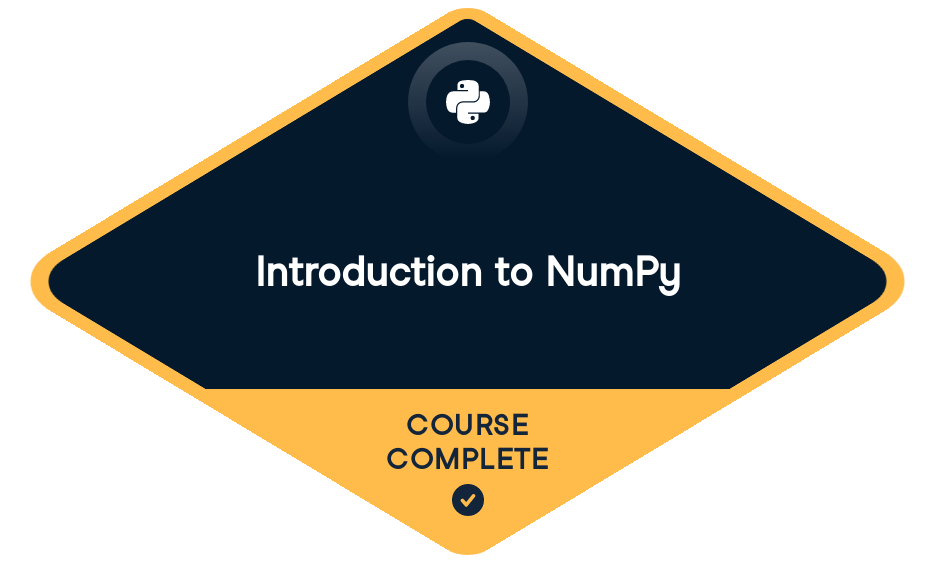
Loved by learners at thousands of companies
Course Description
Explore Python's Data Science package: NumPy
Gain an introduction to Numpy and understand why this Python library is essential to all Python data scientists and analysts. Most importantly, learn more about Numpy arrays and how to create and change array shapes to suit your needs.Discover NumPy Arrays
NumPy is an essential Python library for data scientists and analysts. It offers a great alternative to Python lists, as they are more compact and allow faster access to reading and writing items, making them a more convenient and efficient option.In this Introduction to NumPy course, you'll become a master wrangler of NumPy's core object: arrays! Using New York City's tree census data, you'll create, sort, filter, and update arrays. You'll discover why NumPy is so efficient and use broadcasting and vectorization to make your NumPy code even faster.
Gain Confidence by Practicing on the Monet dataset
By the last chapter, you will use your newly acquired knowledge to perform array transformations. You will use image 3D arrays to alter a Claude Monet painting and understand why such array alterations are essential tools for machine learning.You will gain confidence in Numpy arrays and their different operations upon course completion. This course is part of the Data Scientist with Python track and is perfect for those seeking a Data Science certification with DataCamp.
Training 2 or more people?
Get your team access to the full DataCamp platform, including all the features.- 1
Understanding NumPy Arrays
FreeMeet the incredible NumPy array! Learn how to create and change array shapes to suit your needs. Finally, discover NumPy's many data types and how they contribute to speedy array operations.
Introducing arrays50 xpYour first NumPy array100 xpCreating arrays from scratch100 xpA range array100 xpArray dimensionality50 xp3D array creation100 xpThe fourth dimension100 xpFlattening and reshaping100 xpNumPy data types50 xpThe dtype argument100 xpAnticipating data types100 xpA smaller sudoku game100 xp - 2
Selecting and Updating Data
Sharpen your NumPy data wrangling skills by slicing, filtering, and sorting New York City’s tree census data. Create new arrays by pulling data based on conditional statements, and add and remove data along any dimension to suit your purpose. Along the way, you’ll learn the shape and dimension compatibility principles to prepare for super-fast array math.
Indexing and slicing arrays50 xpSlicing and indexing trees100 xpStepping into 2D100 xpSorting trees100 xpFiltering arrays50 xpFiltering with masks100 xpFancy indexing vs. np.where()100 xpCreating arrays from conditions100 xpAdding and removing data50 xpCompatible or not?100 xpAdding rows100 xpAdding columns100 xpDeleting with np.delete()100 xp - 3
Array Mathematics!
Leverage NumPy’s speedy vectorized operations to gather summary insights on sales data for American liquor stores, restaurants, and department stores. Vectorize Python functions for use in your NumPy code. Finally, use broadcasting logic to perform mathematical operations between arrays of different sizes.
- 4
Array Transformations
NumPy meets the art world in this final chapter as we use image data from a Monet masterpiece to explore how you can use to augment image data. You’ll use flipping and transposing functionality to quickly transform our masterpiece. Next, you’ll pull the Monet array apart, make changes, and reconstruct it using array stacking to see the results.
Training 2 or more people?
Get your team access to the full DataCamp platform, including all the features.datasets
Monet RGB ArrayTree Census ArrayMonthly Sales ArraySudoku Game ArraySudoku Solution ArrayCourse Glossarycollaborators


prerequisites
Intermediate PythonData Coach at iO-Sphere
Izzy is a Head Coach at iO-Sphere. She discovered a love for data during her seven years as an accounting professor at the University of Washington. She holds a masters degree in Taxation and is a Certified Public Accountant. Her passion is making learning technical topics fun.
Join over 18 million learners and start Introduction to NumPy today!
Create Your Free Account
or
By continuing, you accept our Terms of Use, our Privacy Policy and that your data is stored in the USA.